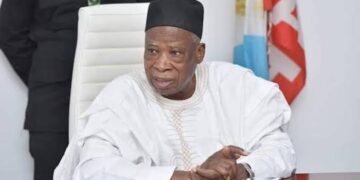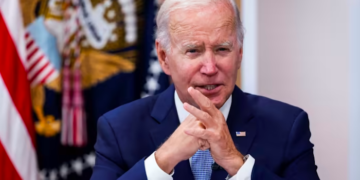The Nigerian government is considering proscribing the Academic Staff Union of Universities (ASUU) if the union refuses to end its strike after receiving an offer.
As part of the deal struck during the renegotiation of the 2009 Agreement, the federal government has granted an extra N100 billion for the higher education sector.
In addition, N50 billion was authorized for distribution among student unions as salary supplements.
The Academic Staff Union of Universities (ASUU), the Senior Staff Association of Nigerian Universities (SSANU), the Non-Academic Union of Education and Associated Institutions (NASU), and the National Association of Academic Technologists (NAAT) are the four university-based unions that have been agitating for the payment of earned allowances.
Remember that on February 14, 2022, ASUU began a month-long warning strike that it has been prolonging to the present day, while the other three unions, beginning with NAAT in March, stopped working.
Disagreements have arisen over the release of revitalization money, the payment of earned allowances, challenges with the IPPIS (Integrated Payroll and Personnel Information System), and the renegotiation of the 2009 Agreement.
Although the Academic Staff Association of the University of Union(ASUU) has asked that its members be paid using the UTAS platform, the University Peculiar Personnel and Payroll System (U3PS) was developed by the non-teaching staff, led by SSANU and NASU.
All three systems have been presented to the government via the National Information Technology Development Agency (NITDA), which has conducted security analyses.
ASUU has been emphatic that the government must pay its members the withheld five months’ salary before it will suspend the six months’ strike, while SSANU and NASU, through their umbrella, Joint Action Committee, JAC, agreed on Saturday to halt the strike on Wednesday for two months.
On Thursday, Minister of Education Mallam Adamu Adamu assured reporters that the Federal Government’s invocation of the “no work, no pay” policy for striking staff at public universities would be fully implemented.
Threat of ASUU Ban
According to several sources in the Presidency and the Ministry of Education, the government is considering the option of prescribing ASUU if the union refuses to reciprocate the Federal Government’s kindness by putting off the strike.
According to one anonymous source: “President Muhammadu Buhari has granted additional N100 billion for the universities and roughly N57 billion for the Polytechnics and Colleges of Education because of the emphasis he has devoted to education.”
This is in keeping with the agreement reached with the unions during the renegotiation of the 2009 Agreement. Professors will have a 35% raise, and other lecturers will see a 23.5% bump, thanks to a recent government decision. Furthermore, the government allocated N50 billion in compensation for the striking unions’ lost wages.
To refuse to end the strike so that our kids can return to class after the government took this step would be unpatriotic on the part of ASUU. The administration appreciates SSANU and NASU’s solidarity for patriotic reasons.
Unions, and ASUU in particular, are required by law to end a strike while a trade dispute is being arbitrated.
According to publicly available information, Nigeria’s Minister of Labor and Employment predicted a strike on February 22, 2022, and subsequently met with ASUU on that date and again on March 1 to try to resolve their differences; in contrast, the Minister predicted disputes with SSANU and NASU on May 3.
Why should ASUU claim the Federal Government has done nothing? You may also recall that President Obama recruited Professor Ibrahim Gambari, his Chief of Staff, and Mr. Boss Mustapha, the Secretary to the Government of the Federation, to help broker an end to the strike. “Why is ASUU being so stubborn and defiant?”
While expressing their dismay at ASUU’s alleged lack of gratitude for the government’s efforts, the sources emphasized that the federal government had numerous alternatives available to it, including prescribing the union.
If ASUU continues to be unpatriotic, the government can choose from a wide range of responses. Optionally, the Trade Unions Act and even the Trade Disputes Act could be used to outlaw ASUU.
The President has the authority to outlaw any group whose activities are harmful to the country’s economy. Under the Trade Unions Act, the President has the authority to revoke a union’s certificate if the group’s actions are inconsistent with the requirements for registration.
The Minister of Labor may also file a petition with the National Industrial Court under Section 17 of the Trade Dispute Act. As per Section 18 of the Trade Dispute Act, once a trade dispute is apprehended by the Minister of Labour and Employment and conciliation is ongoing, the matter must be referred to the National Industrial Court for adjudication to enforce the legality or otherwise of the ongoing prolonged strike by ASUU.
As of yesterday’s press time, attempts to confirm the claimed government offer from Minister of Labour and Employment, Senator Chris Ngige, to either prescribe ASUU or drag it to the National Industrial Court if it fails to cease the strike, were fruitless.
Strike by NASU and SSANU called off for two months.
On Saturday, the Joint Action Committee (JAC) of the Non-Academic Staff Union of NASU and SSANU stated that the strike will be called off beginning on Wednesday, August 24, 2022, and lasting for the first two months.
JAC spokesman Prince Peters Adeyemi said in a statement that negotiations between the two unions and the Federal Government delegation led by the Minister of Education, Mallam Adamu Adamu, resulted in the suspension of the strike.
The administration needed two months to implement the accords, according to the statement.
U3PS, the issuance of the white paper on the university inspection panel, and government funding of the institutions are all part of the deal. The government has agreed to set about N50 billion for the payment of earned academic and earned allowances.
When asked about the federal government’s inadequate funding, the minister said he had instructed the National Universities Commission (NUC) to make sure that all universities were up to date on their obligations or face penalty.
The education minister further promised that strikers would face no retaliation for their actions.
According to the Minister, President Muhammadu Buhari plans to allocate 15% of the federal budget on educational spending.
On the topic of salary payments, the Minister praised the success of the alternatives offered by the ASUU JAC of NASU and SSANU. The Federal Government, he continued, “is waiting for the findings of the technical committee it set up before taking action on the problem.”
After meeting with the Federal Government, chaired by the Minister of Education, the JAC spokesman added, “After very prolonged conversations and dialogue between the two unions and the Federal Government, the two unions decided to suspend the strike for the initial period of two months.”
After hearing the government’s offers, “our members think that since the majority of the points that are in contention have been largely resolved by the government, the strike should be suspended effective this Wednesday, August 24, 2022.”
Similarly, SSANU’s President Comrade Mohammed Ibrahim released a statement saying, “Nigerians would recall that the Joint Action Committee of NASU and SSANU began on a National Industrial Action on March 27, 2022.”
“The National Industrial Action was for an initial two weeks, but due to the nature of the response—which we regarded essentially nonexistent—had to be renewed for another two weeks, leading to another one month, and then three months to allow actual decisions to be taken on our requests.
The strike, which is now 146 days old, was intended to emphasize the seriousness of our demands.
Bad management and financing lead to subpar performance at public colleges
During the strike, we met with the White House chief of staff and other government officials.
To secure a swift resolution to the impasse, we had also met with the Minister of Labor and Employment, the Minister of Education, and the chiefs of different government agencies.
“As ethical unions, we have always been guided by the concept that in collective bargaining, neither side should gain nor lose anything. We are not nave enough to believe in a winner-takes-all ethos; rather, we prioritize the welfare of our members, the success of the Nigerian higher education system as a whole, and the country of Nigeria as a whole.
“If the government and the union(s) had fulfilled their obligations, this strike could have been prevented. Disregard for freely engaged into agreements has been a scourge on the university system, threatening to derail efforts at industrial harmony.
“The government is dedicated to upholding its agreements”
It is only honorable, we believe, to give the government the benefit of the doubt while the necessary is being done on the government’s end. “Today, (Saturday) after series of engagements with the Minister of Education and having considered the issue that led to the strike, and having satisfied ourselves that government, this time around, has committed itself to agreeing to respect the agreements that have been reached at the meetings.
To that end, we’re writing to let you know that the government has two months to put into practice the agreements we’ve reached with them. This two-month period is more like a ceasefire than an end to the industrial action.
Given the Minister of Education’s pledge and our determination to bring an end to the current impasse, we really hope that the two-month window will be long enough for action to be done and the situation finally resolved.
In the interest of peace in our universities and Inter-university centers, we would like to thank all Nigerians, the Nigeria Labour Congress and affiliates, the media, and all stakeholders in the Nigerian educational system for their various roles thus far, and we would like to implore them to continue to prevail upon the government to play its own side of the bargain.
Because of the foregoing, all NASU and SSANU employees are to report for work on Wednesday, August 24, 2022.
Thursday will be the day of the next NAAT meeting.
While this is going on, the NAAT (National Association of Academic Technologists) will be holding a meeting on Thursday to discuss whether or not to sign an agreement with the government to terminate the strike.
In a phone interview with Vanguard yesterday, NAAT President Conrade Ibeji Nwokomma said, “We held a zoom meeting on Saturday and directed our branches to call a congress for a referendum and come for a physical NEC (National Executive Council) meeting on Thursday, August 25.”
“After the meeting, we will be in a better position either to halt the strike or to continue with it. We will call off the strike for three months if we have approval from the branches.
“The issuing of the enabling circular for the Consolidated Salary Structure for Tertiary Institutions, CONTISS 14 and 15, will be the subject of the referendum. The seven months’ worth of back pay for occupational hazard allowance, as well as the back pay for the minimum wage and the subsequent adjustment for our members that was left out of that payment.





























